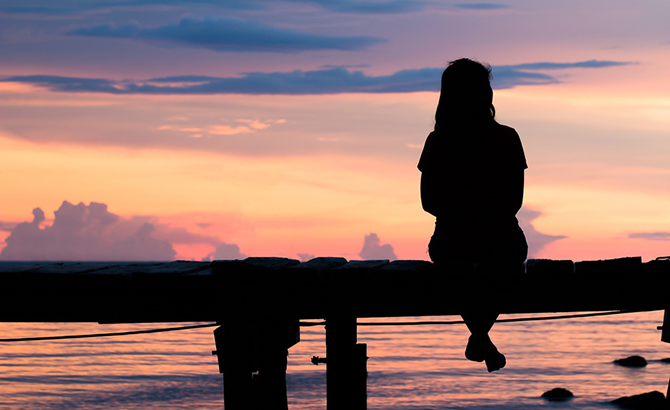
How We Cope with Hope "Healthy Brain, Healthy Mind" Series (Week 2) with Dr. Jay Kumar
May 12, 2020
How We Cope with Hope
“Healthy Brain, Healthy Mind” Series
Chapman University’s Director of Contemplative Practices and Well-being
Advances Strategies for Coping During Crisis and Uncertainty.
“Crisis-Coping” Fatigue
Learning to cope in the midst of crisis and uncertainty can understandably take its toll on your brain, body, and being. These feelings can become all the more heightened in a situation like the COVID-19 crisis when trying to manage your stress and anxiety.
As I highlight in my first piece Be Adaptive, Not Reactive to Change, we’re actually dealing with two simultaneous contagions—the threat from the actual virus and the spreading psychological trauma it generates. I’m finding that our Chapman students and those in my personal life are experiencing what I call “crisis-coping” fatigue—we’re simply overwhelmed trying to cope with feelings of fear, grief, and hopelessness. It’s exactly what many of you also voiced in this week’s “Healthy Brain, Healthy Mind” podcast.
I find the following phrases are becoming all too common:
“I wake up in the middle of the night with my thoughts racing.”
“It’s hard not to feel hopeless and scared for myself and my family.”
“How can I manage my exhaustion and overwhelm?”
Most of you know that stress does more than just create anxiety and worry. Left unchecked, chronic stress undermines your ability to focus, sleep, work, and persist. “Coping fatigue” can occur when the demand on your cognitive capacity surpasses what you’re normally able to manage and regulate. When this cognitive overload becomes unrelenting and feels out of your control, is it any wonder we’re dealing with “coping fatigue” at the moment? What can you do? As my students in Chapman’s “Happiness” course discover, both brain science and timeless spiritual wisdom provide strategies for us to cope and not to lose hope.
Brain Science and Buddhist Psychology
From the perspective of brain science, we humans can only retain a finite amount of cognitive information in any given moment. As a strategy for survival, the human brain evolved primarily to “focus on the bad, forget the good” in moments of crisis or trauma. It’s a concept sometimes referred to as your brain’s negativity bias. Your “Survival Brain” evolved to focus on negative experiences and register stressful situations more strongly than remembering positive ones.
Here’s how you can understand it. I’ve often heard your brain’s negativity bias as best explained by the following phrase: “Your brain is like Velcro for negative experiences and like Teflon for positive ones.” What that means is your brain excels at making the bad experiences stick, while making the good ones slip away. This concept is the essence behind your brain’s negativity bias—your brain is biased to remember more effectively the stressful and negative experiences than the joyful, happy ones. Your brain’s built-in negativity bias can be one reason behind “coping fatigue” that can lead us to lose hope and drop into despair.
Borrowing wisdom from Buddhist psychology, it reveals that one primary source of suffering originates in the failure to accept the nature of change. Putting this idea into the context of the current crisis, here’s a Buddhist riddle: How do you make a happy person become sad, and a sad person become happy? Just say, “What you’re feeling will soon pass.”
What this punch line implies is how the Buddha realized nothing lasts forever—both good times and bad times are temporary experiences. Both pain and pleasure are fleeting sensations in your fluctuating mind, but in the moment your mind deceives you into thinking these states are permanent. In the case of pain, you suffer when you forget painful experiences are only temporary. We suffer when we forget that everything in life is never permanent. The Buddhist notion of impermanence is not unique, as it is equally reflected among the world’s spiritual traditions by the common phrase: This, too, shall pass. It is exactly this universal concept of embracing the temporary nature of suffering is what we first need to remember as a strategy to combat “coping fatigue”.
Although you may find it even more challenging right now to stay calm and centered, please don’t lose hope.
To help you discover strategies to minimize “coping fatigue”, enjoy the “highlights” video from this week’s webinar.
“Remember, you are not alone during times of uncertainty and change. Please reach out to us at the Fish Interfaith Center if you wish to speak virtually with our “Chat with a Chaplain” or learn more resources in the following article. Learn to embrace these moments as a transitional state of opportunity—a sacred gift to create, innovate, transform, and renew. These unprecedented and uncertain periods in your life may actually provide newness in the future you never thought possible. Trust in your power to endure and persist. We will get through this together. Humanity has endured far worse. We will prevail.
“Healthy Brain, Healthy Mind”
Every Thursday 3-4pm PST
Join Zoom Meeting
Previous and upcoming webinar topics:
(link to videos/blogs) Apr. 16 “Be Adaptive, Not Reactive” – employ behavioral strategies to help you adjust to the challenges and disruption caused from remote working/learning.
Apr. 23 “How to Cope When You’re Cooped In” – discover cognitive-based techniques for you to manage work, family, and life while “self-isolating”.
Apr. 30 “Reaching Out While Remote Working” – utilize technology and other innovative ways to stay socially connected with your colleagues and friends while physically distancing.
May 7 “Tips for Calm in Times of COVID” – learn meditation practices for staying calm, centered, and focused during your day.
May 14 “Practicing Proper Mental Hygiene” – apply strategies from science and wisdom from spirituality into your daily routine for maintaining a healthy brain, a healthy mind, and a healthy outlook on life.
More to come…
CHAPMAN HOPE
The “Healthy Brain, Healthy Mind” webinar series is one of the many online resources that are part of the new virtual platform CHAPMAN HOPE
Follow our Fish Blog for regular reflections by the Fish Interfaith Center staff. Please reach out to the Fish Interfaith Center and avail yourself to the valuable resources at CHAPMAN HOPE. As our Chapman community collectively adjusts to this new normal together, the Fish Interfaith Center is here for you—always.
Learn more at www.chapman.edu/fic or contact interfaith@chapman.edu
Connect with us on social media:
Facebook @FishInterfaithCenter
Instagram @FishInterfaithCenter
Twitter @CU_Interfaith
Hashtags #ChapmanHope #ChapmanCalm
Stay Calm. Stay Safe. Stay Healthy.
Dr. Jay Kumar
Director of Contemplative Practices & Wellbeing
kumar@chapman.edu
